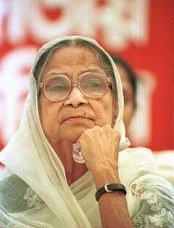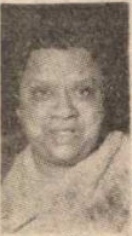Related Research Articles

Begum Sufia Kamal was a Bangladeshi poet, feminist leader, and political activist. She took part in the Bengali nationalist movement of the 1950s and civil society leader in independent Bangladesh. She led feminist activism and was a president of Bangladesh Mahila Parishad. She died in 1999 and was the first woman to be given a state funeral in Bangladesh.
Awards and decorations of the Bangladesh Liberation War were decorations which were bestowed by the major warring parties during the years of the Bangladesh Liberation War. Bangladesh, India and Pakistan all issued awards and decorations during the conflict.
Rabeya Khatun was a Bangladeshi novelist. She wrote over 50 novels and more than 400 short stories. Her works also include essays, research, religious history and travelogues. She was awarded Bangla Academy Literary Award in 1973, Ekushey Padak in 1993 and Independence Day Award in 2017 by the Government of Bangladesh.

Ekushey Padak is the second highest civilian award in Bangladesh, introduced in memory of the martyrs of the Bengali Language Movement of 1952. The award is given to recognize contributions in a number of fields, including culture, education, and economics. The Ministry of Cultural Affairs administers the award.

The Independence Day Award, also termed Independence Award, Swadhinata Padak, and Swadhinata Puroskar, is the highest state award given by the government of Bangladesh. Introduced in 1977 by president Ziaur Rahman, this award is bestowed upon Bangladeshi citizens or organizations in recognition of substantial contribution to one of many fields, including the War of Liberation, the Language Movement, education, literature, journalism, public service, science and technology, medical science, social science, song, games and sports, fine arts, rural development, and other areas.

Firoza Begum was a Bangladeshi Nazrul Geeti singer. She was awarded the Independence Day Award in 1979 by the Government of Bangladesh.

Begum Akhtar Sulaiman (1922–1982) was a Pakistani-Bengali social worker, political activist and the daughter of Huseyn Shaheed Suhrawardy, the fifth Prime Minister of Pakistan. Begum Akhtar Suleiman, went out on a limb to support the Yahya Khan regime during the war of 1971. She started actively supporting the activities of the Yahya Khan government. She gave a number of statements at that time on behalf of the Suhrawardy family saying her father believed in Pakistan. Her daughter Shahida Jamil served as the first female Pakistani Federal Minister for Law.

Ferdausi Rahman also known as Ferdausi Begum is a Bangladeshi playback singer. She is the daughter of folk singer Abbas Uddin. She sang some popular film songs for Pakistani films also in the 1960s especially working with the music composer Robin Ghosh in film Chakori released in 1967. She was awarded Ekushey Padak in 1977 and Independence Day Award in 1995 by the Government of Bangladesh. In addition, she was awarded the lifetime achievement award of the National Film Award in the year 2015.
The existing Bangladeshi honours system was created after Independence of Bangladesh. The most highest civilian honours are the Independence Award and Ekushey Padak. They are awarded every year. The awards are civilian awards for a broad set of achievements in fields such as Education, Arts, Civil Service, or Social Service and Liberation War. Awards were also bestowed posthumously and they are not given for foreign citizens.
Kazi Abul Monsur was a physician and microbiologist of Bangladesh. He was awarded Independence Day Award posthumously in 1996 by the Government of Bangladesh for his contribution in the field of medical science.
Pran Gopal Datta is a Bangladeshi physician, university administrator and politician. In September 2021, he won the candidacy of membership of Jatiya Sangsad representing the Comilla-7 constituency in a bi-election unopposed. The membership of the constituency became vacant after Ali Ashraf died in office in July 2021.
Md Obaidul Kabir Chowdhury is a dermatologist in Bangladesh. He was awarded the Independence Day Award in 2020 for his unique contribution to medicine.
Gaus Khan was a prominent politician in Bangladesh and a British expatriate organizer. He was awarded the Independence Day Award in 2011 for his unique contribution to the formation of public opinion and the collection of foreign aid during the Bangladesh Liberation war.
Mohammad Abul Khayer was a renowned politician, freedom fighter and social worker of Bangladesh. He recorded the 7 March Speech of Bangabandhu Sheikh Mujibur Rahman. In 2014, he was awarded the "Independence and Independence War Liberation Award" for his unique general contribution to the Bangladesh Liberation War.
Abu Zafar Mohammad Saleh, popularly known as the Pir of Sarsina, was a Bangladeshi Islamic scholar. He was said to have contributed to the establishment of 3000 educational institutions. Saleh had also pushed for the establishment of the Islamic Arabic University and ibtedayi madrasas in Bangladesh. Despite being a recipient of the Independence Day Award, he has been accused of collaborating with the Pakistan Army and committing war crimes during the Bangladesh Liberation war.
Mostak Ahmad is an athlete and veteran of the Bangladesh Liberation War. He was awarded the Independence Day Award, Bangladesh's "highest civilian award" in 1977 for outstanding achievements in sports.
Jahanara Begum is a Bangladeshi social worker. Dubbed the Queen of Cottage Industry, she engages poor women in training and working in the cotton industry.
Masuma Begum was an Indian politician, social worker, and feminist. She was a member of the Indian National Congress party, serving as their deputy leader, and was active in politics in Andhra Pradesh, becoming a member of the cabinet in 1960. She was the President of the All India Women's Conference in 1962, and worked towards building networks with international feminist organizations, advocating family planning, and working with social welfare organizations in Hyderabad. She was an early public advocate for the end of the social seclusion of Indian women, a practice known as purdah. She was a recipient of the Padma Shri, one of India's highest civilian honors, in 1974.
Siraj Uddin Ahmed a former Bangladeshi government official, writer, politician and freedom fighter. He was awarded the Independence Award in 2022 for his contribution to the war of independence and liberation.
AKM Bazlur Rahman was an Awami League politician and recipient of the Independence Day Award, the highest civilian award in Bangladesh.
References
- 1 2 3 স্বাধীনতা পুরস্কারপ্রাপ্ত ব্যক্তি/প্রতিষ্ঠানের তালিকা (in Bengali). Cabinet Division, People's Republic of Bangladesh Government . Retrieved 9 October 2017.
- ↑ বন্ধু ফজলে বারী, স্মৃতি অক্ষয় হোক. Prothom Alo (in Bengali). Archived from the original on 1 December 2017. Retrieved 10 November 2017.
- 1 2 চুয়াডাঙ্গা জেলার প্রখ্যাত ব্যক্তিত্ব. Alokito Chuadanga (in Bengali). Retrieved 10 November 2017.
- ↑ Sanjida Khan (January 2003). "National Award: Independence Day Award". In Sirajul Islam (ed.). National Award. Dhaka: Asiatic Society of Bangladesh. ISBN 984-32-0576-6.
- ↑ স্বাধীনতা পদকের অর্থমূল্য বাড়ছে. Kaler Kantho (in Bengali). 2 March 2016. Retrieved 25 October 2017.
- ↑ এবার স্বাধীনতা পদক পেলেন ১৬ ব্যক্তি ও সংস্থা [This time 16 individuals and organizations received the Independence Medal]. NTV (in Bengali). 24 March 2016. Archived from the original on 1 December 2017. Retrieved 25 October 2017.